

Boxing with Elephants: Can Canada Punch above Its Weight in Global Financial Governance? Canadian Outlook Long-Term Economic Forecast: 2013. Canada Economy: Population, GDP, Inflation, Business, Trade, FDI, Corruption. Tame growth for Canada’s economy means low interest rates for longer: IMF. OTTAWA — The world’s key nation lender and fiscal watchdog has given Canada’s economy a passing grade — but just barely.
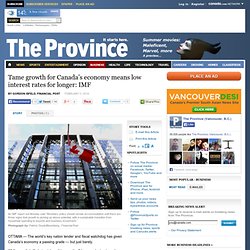
While growth is likely to pick up this year, it will be a modest gain and won’t point to the much-needed rotation from household spending and residential construction toward exports and business investment, the International Monetary Fund acknowledged Monday. These economic imbalances are not without risks, the IMF said in its latest assessment of Canada. Among them, limiting the flexibility of monetary policy and possibly requiring the federal government to delay its budget balancing commitment. Despite the recent moderation in the housing market and pace of consumer borrowing, the Washington-based agency said the environment of record-low borrowing costs and a still-hot housing market “reduces the room for lowering the [Bank of Canada’s] policy rate.” The IMF, however, anticipates a rate increase will come earlier in that year. Related Mr. How Canada can get out of economic slump: Walkom.
Six years ago, Canada’s economy was the envy of the world.
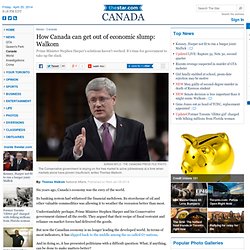
Its banking system had withstood the financial meltdown. Its storehouse of oil and other valuable commodities was allowing it to weather the recession better than most. Understandably perhaps, Prime Minister Stephen Harper and his Conservative government claimed all the credit. They argued that their recipe of fiscal restraint and reliance on market forces had delivered the goods.
But now the Canadian economy is no longer leading the developed world. And in doing so, it has presented politicians with a difficult question: What, if anything, can be done to make matters better? Indicators first. Canada is certainly not Greece. So, too, in economic growth. Canada’s export growth has fallen, thanks in part to a loonie that, even after its latest dip, is still too high. Our inflation rate is strikingly low. A closer look at the single biggest long-term threat to Canadian economic growth - Business, Future of Jobs. Fernando Morales/The Globe and Mail/CP On a recent February evening, Karl Eve received an emergency call from a restaurant owner in Canmore, Alta.
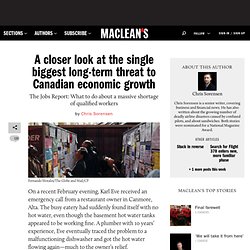
The busy eatery had suddenly found itself with no hot water, even though the basement hot water tanks appeared to be working fine. A plumber with 10 years’ experience, Eve eventually traced the problem to a malfunctioning dishwasher and got the hot water flowing again—much to the owner’s relief. It’s the sort of detective work Eve says he loves about his job. He also likes that his plumbing business, which he runs with his wife in nearby Exshaw, provides his family with a comfortable middle-class lifestyle. Canada's economic future tied to global competitiveness: report. According to a new study from the Certified General Accountants Association of Canada, the country's small and medium-sized businesses can play a large role in expanding and diversifying Canada's international trade.
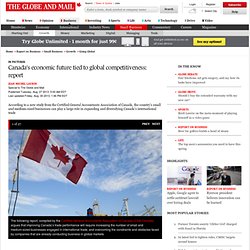
Low productivity, aging population threaten Canada's long-term economic prospects. Boom, Bust and Echo author says addressing Canada's labour challenges is key to continued growth David Foot By Richard Chu Mon Sep 30, 2013 12:01am PST BC is poised to benefit from the demographic shifts happening in Asia, but only if it can get its own aging job market in order.
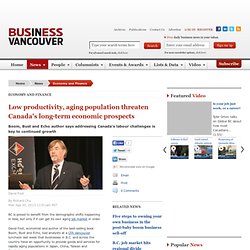
David Foot, economist and author of the best-selling book Boom, Bust and Echo, told analysts at a CFA Vancouver luncheon last week that businesses in B.C. and across the country have an opportunity to provide goods and services for rapidly aging populations in Japan, China, Taiwan and South Korea. "If you understand that the biggest growth is in the 50-plus market, it's a fantastic market to be in," he said.
Last week Canada and Japan said they would co-operate more in developing the natural gas market, something Foot said B.C. could benefit from if the liquefied natural gas industry finally establishes itself in the province. Some of the key emerging markets include: The wages of fear: How Canadians see the economy. As most Canadians blithely ignore the throne speech (our past research shows only about 10 per cent pay attention to it), we thought it would be worthwhile to look deeper at what’s on the minds of Canadians today.

Is there any linkage between this framing document for the government’s agenda and the salient concerns of the citizenry? We begin by reiterating the evidence that there’s a sense of malaise out there. Confidence in the nation’s direction is at a modern historical low and this has registered on the political landscape with a scant 26 per cent saying they would vote for the incumbent government. This erosion of confidence in national direction and federal stewardship is linked strongly — but not exclusively — to the economy.